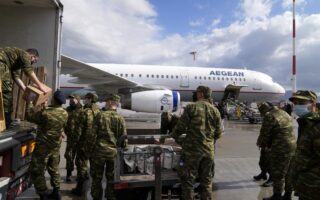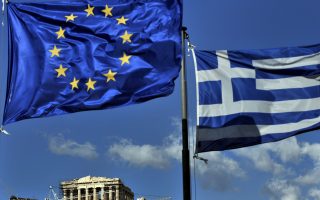Combining joint interests to avert tensions

The new era signals a need for a new national strategy. The impact of Russia’s invasion of Ukraine will be felt across the planet. The European Union has entered a period of tectonic shifts with regard to the defense of its borders, its energy dependence on Russia and, of course, its active championing of its values. These changes also concern the broader EU neighborhood. There is turmoil in the Balkans that is centered on Serbia, and Turkey is seeking to reposition itself in regional and international developments, especially in terms of energy.
In 1999, Greece achieved the Helsinki agreement. It was a period defined by the biggest wave of expansion in the history of the EU and the Economic and Monetary Union (EMU), of decisions that would forever change Europe. In that historic moment, Greece submitted a strategic plan that combined national, Cypriot, European and Turkish goals. With this agreement, the EU established the settlement of Greek-Turkish disputes by 2004 as a precondition for Turkish accession talks. It also liberated the Republic of Cyprus from the shackles of the “Cyprus question,” making a member-state without a resolution on the issue of reunification.
With all the shocking events happening around us today, now is the time for a new, out-of-the-box strategy. Europe’s energy independence from Russia means that we need to look for new sources and new conduits. The Eastern Mediterranean (Israel, Cyprus) has significant reserves that have attracted the interest of industry giants, and the same is the case with Crete and the Ionian Sea. What we need, therefore, is a new idea that will combine joint interests and bring benefits to all the regional parties involved.
The birth of the EU as an economic partnership and the experience of the Helsinki agreement as a specific strategy with significant results are argument enough for the need of a new strategy. We have the institutions and technocratic mechanisms to present a plan that could support energy independence for Europe while at the same time uniting the countries of the Eastern Mediterranean in an alliance that will benefit their people. With war back in Europe, it is interesting to look back on the day after World War II and at how a Europe in ruins became a global force within 20 short years.
The end of WWII found the countries of Europe devastated, national rivalries heightened and prospects of an economic recovery dampened by the re-emergence of national economic rivalries stemming from the past. Yet one brilliant mind, that of French diplomat Robert Schuman, came up with the steps of Europe’s unification. The Schuman Plan took all of the above factors into account, together with, of course, the Soviet threat and the leading role played by the United States, while also laying down a series of assumptions demonstrating how peace in Europe would be short-lived unless certain specific economic targets were attained. The age-old rivalry between France and Germany, along with many other disputes between nations, needed to be settled, starting with immediate action on a very specific but very important front: putting coal and steel production under a single higher authority. This merger of economic interests would contribute to improving quality of life, creating an economic community and helping each country grow individually.
When the plan was first announced, it was dismissed as slipshod and inapplicable. A year later, the French initiative evolved into a technocratic plan that was fine-tuned by financial, technical and international relations experts, and around which six countries joined forces. The political leaders of the day went above and beyond, and made decisions that would prove decisive for the futures of their countries – all of which came out the winners. The threat of war was forgotten, those countries’ economies took off – with the help of the US Marshall Plan as well – and Europe bounced back in almost no time at all. The role of the United States proved instrumental, not just because of the enormous amount of financial assistance it provided, but mainly because it joined European politicians in looking for multilateral cooperation mechanisms that would allow better solutions for everyone. This multilateral and multifaceted cooperation after the war not only helped rebuild the countries of Europe, it also set the foundation of the European Economic Community and its successors, the European Union and the European Monetary Union. And everyone gained.
Steel and coal no longer play the role they once did, but how they were managed altered the course of history
The blood-drenched French-German rivalry transformed into the “French-German” engine driving the EU forward. History cannot be reduced to an obsession; it evolves and becomes a lesson. Back then it was coal and steel, now it’s oil and natural gas, which will be essential for the next 30 years at least, until they are replaced by new technologies and renewable energy sources.
So, can we come up with a plan for a joint economic future that seeks to achieve prosperity and peace in the Eastern Mediterranean while addressing a problem that is vital for the EU?
By implementing a strategy of deterrence, Greece is in a position to assume both peace and growth initiatives. To begin with, let us consider a discussion of technocrats for bringing the management of hydrocarbon deposits under the purview of one joint higher authority, in which each country would participate depending on what it brings to the table: natural resources, advanced technology, maritime and land passages, experience and markets.
Steel and coal no longer play the role they once did, but how they were managed altered the course of history. This requires cooperation between all the parties involved, within the framework of internal law, not just for valuable natural resources, but also for blue development, in an area where the sea is a bountiful source of treasure. Let us discuss exploitation under the terms outlined by international law for multilateral and multiple partnership, as well as the activation of a superior source of power, like US-EU cooperation.
The discussion right now revolves around conflict, disputes, migrant flows and the movements of warships. It could also be about cruise liners, LNG carriers, Mediterranean shipyards, multiple pipelines in cooperation with technical companies, joint operation rules, partnerships between technical universities and realizing students’ dreams instead of soldiers’ nightmares.
Anna Diamantopoulou is the president of the Athens-based think tank Diktio (Network for Reform in Greece and Europe), head of the European Union’s high-level expert group on the future of social protection and of the welfare state, a former EU commissioner and a former minister.





